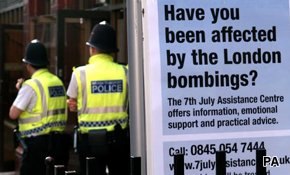Five years on from the 7th July 2005 terrorist attack on the London Underground, known as ‘7/7’, more than half (53%) of the UK’s population think that the threat of terrorism has stayed at the same level, with older people feeling slightly more worried than their younger counterparts.
However, when we repeated the question in a slightly different way, we see that the public is actually less concerned about terrorism than it thinks – 76% now think future terrorist attacks on British targets are likely, compared to 92% four days after the bombings, which affected three Underground trains and one bus.
Perhaps this general sense of security is due to most (51%) thinking that the last Labour government dealt with extremism and terrorism ‘effectively’. More than a third (35%), however, said that Labour was ineffective in dealing with the threat.
Indeed, a sizeable quarter believes that the threat has actually increased since 2005. Interestingly, women are more likely to think that it has increased (30%) than men (21%). Older people are more worried than their younger counterparts, with 81% of those over 60 believing that future attacks are likely compared to 57% of 18-24 year olds.
As for the public’s opinion on how the new Coalition Government is going to fare against terrorism, 41% think that it will be effective, whereas just over a quarter (27%) foresee it as being ineffective.
Tube or bus?
The survey also assessed the effect that 7/7 had on people’s attitudes to travelling on public transport and found that while most still feel confident, a significant minority remains apprehensive. 58% stated that the attacks did not make them less likely to use public transport; while 22% said it affected them, but only ‘for a while’. Only seven percent say they are ‘still less likely to use public transport’.
Despite these hints of concern, the general feeling among respondents is that any future attacks will be unlikely to affect them personally. When asked about the chances of them or a family member being attacked or wounded as a result of an attack, the majority (59%) felt that the chances were fairly or very low. Nearly a fifth (19%) said the chances were ‘almost non-existent’.
Muslims in society
Reassuringly, the bombing, which has been attributed a group of four British-based Muslims, including Mohammed Siddique Khan, does not seem to have affected the public’s perception of Muslims on the whole; the majority (60%) said that it made ‘no difference to their opinion’. Perhaps more worryingly, though, a third of respondents quoted that the attacks made them more negative towards British Muslims, and a large 43% of respondents think that since the attacks British Muslims have become ‘less integrated’ into British society.










